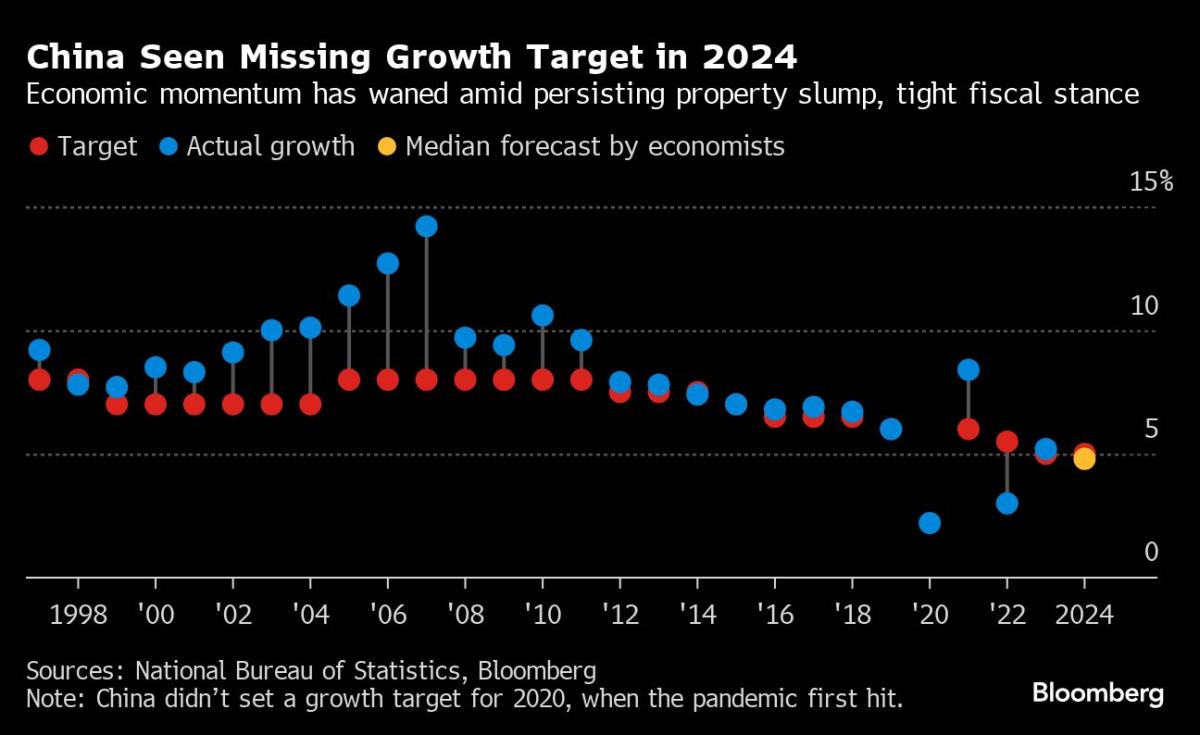
(Bloomberg) — Back in January, Premier Li Qiang trumpeted China’s success in exceeding its 2023 growth goal without resorting to “massive stimulus.” Repeating the same feat this year now looks less likely.
Most Read from Bloomberg
Pressure is growing on Chinese authorities to quickly ramp up fiscal and monetary stimulus to hit this year’s growth target of around 5%. Data published Saturday showed industrial output marking its longest slowing streak since 2021 last month, while consumption and investment weakened more than expected.
Hours before the release, the People’s Bank of China signaled in a rare statement alongside disappointing credit data that fighting deflation would become a higher priority, and indicated more monetary easing ahead.
“This set of data calls for aggressive fiscal expansion to change expectations and to rejuvenate confidence in the economy,” Hao Hong, chief economist at Grow Investment Group, wrote on social media platform X. “Otherwise we would be sleepwalking to a deepening gloom.”
The deterioration is testing President Xi Jinping’s tolerance for missing a high-profile target, as he balances growth with avoiding the big stimulus that fueled previous boom-and-bust cycles. Failure to achieve the goal could further undermine confidence in the world’s No. 2 economy, where foreign investors already pulled a record amount of money from China in the second quarter.
August’s data bolstered evidence that the Chinese economy has weakened since growth in gross domestic product slowed to 4.7% in the three months ending June. That was the worst pace in five quarters, and — crucially — below Beijing’s annual target of around 5%.
The focus is now on October’s third quarter reading. Data so far suggests GDP will expand at 4.6%-4.7% for the period, BNP Paribas SA’s chief China economist Jacqueline Rong estimates.
Analysts at Macquarie Group Ltd. including Larry Hu expect full-year growth to come in at that level if the current momentum continues into the December period, “missing the target of around 5%.” Goldman Sachs Group Inc. over the weekend downgraded its GDP forecast for this year to 4.7%, adding to the chorus of doubt.
That would mark the second time in three years that China failed to hit its target. Covid lockdowns in 2022 led to the biggest miss since the government began setting GDP targets in the early 1990s.
President Xi last week appeared to signal tolerance for a rate slightly lower than 5%, when he urged officials to implement existing policies to “strive to achieve” the full-year goals. That language seemed less forceful than a July call to “resolutely” meet the objectives.
“He was avoiding putting too much pressure on the officials to hit 5% growth,” said Ding Shuang, chief economist for Greater China and North Asia at Standard Chartered Plc. “As long as they implement policies faithfully, a growth rate eventually slightly lower than 5% would be acceptable, I think.”
Xi made the remarks at a gathering of some Communist Party chiefs held in the country’s northwestern Gansu, which is among the 12 provinces deemed by the central government to have an alarmingly high amount of debt.
Once a key driver of growth, provinces have turned more reluctant to spend. Their issuance of new special bonds in the first eight months of the year was at the slowest pace since 2021. That left local officials with about 1.4 trillion yuan ($197 billion) in this year’s quota still to tap, according to data compiled by Bloomberg.
While the central government could step in and repeat last year’s rare ad hoc budget revision to unleash more spending, time is running out to rescue the 2024 target. Analysts are forecasting further rate cuts and a reduction to the amount of cash lenders must keep in reserve, with September seen as a window.
“Even if additional stimulus is introduced today, the impact on the full year growth may be limited,” Ding added. “My take is that leaders may be coming to terms with the reality that there’s only about one quarter left for this year.”
Part of the problem is the ongoing property slump that Barclays Plc calculates has caused Chinese households to lose some $18 trillion in wealth. Real estate investment contracted in the double digits in August, according to estimates by Nomura Holdings Inc. economists including Lu Ting.
Deflation is also becoming more entrenched. Underscoring the risks, private investment fell in the first eight months of the year, as companies locked in price wars struggled to make a profit.
The PBOC on Friday echoed a pledge by Governor Pan Gongsheng in June to make “maintaining price stability and pushing for the mild rebound in prices an important consideration.” However, it did not repeat Pan’s comment of “keeping policy restraint” or avoiding drastic measures.
“The central bank may have made fighting deflation a higher priority,” said BNP’s Rong. Policies may “pivot more” toward encouraging household spending, as the PBOC also put emphasis on consumption and investment, she added.
Still, as bad as the data looks, policymakers will likely hold off aggressive stimulus while the economy broadly holds up. Exports last month hit their highest value in nearly two years, even as China faces a rising tide of tariffs from the US and European Union.
“It is unlikely that China’s senior policymakers don’t care about growth anymore,” said Louis Kuijs, chief Asia-Pacific economist at S&P Global Ratings. “But it is hard to know how weak the economy needs to get before they will agree to a more expansionary fiscal policy.”
Most Read from Bloomberg Businessweek
©2024 Bloomberg L.P.
EMEA Tribune is not involved in this news article, it is taken from our partners and or from the News Agencies. Copyright and Credit go to the News Agencies, email news@emeatribune.com Follow our WhatsApp verified Channel





